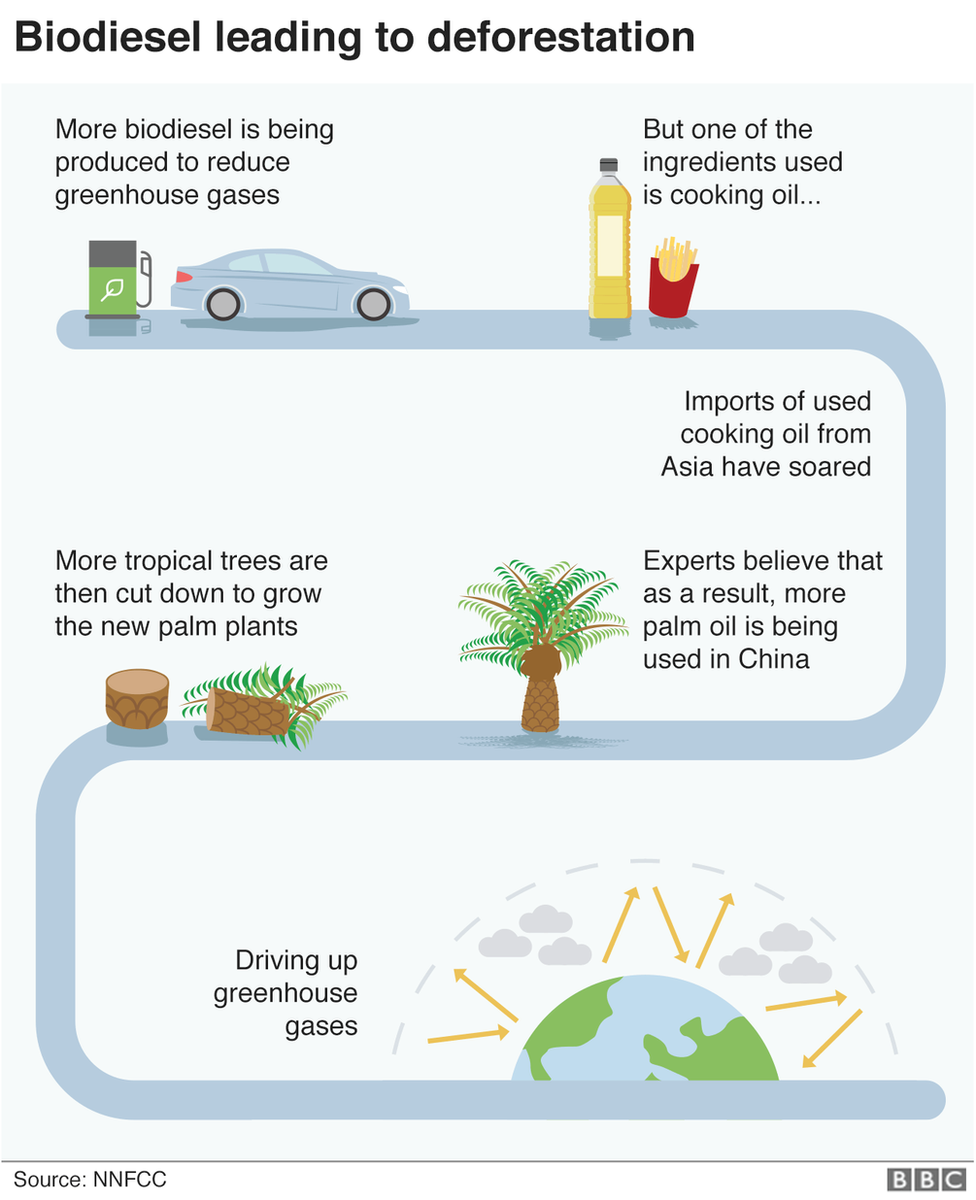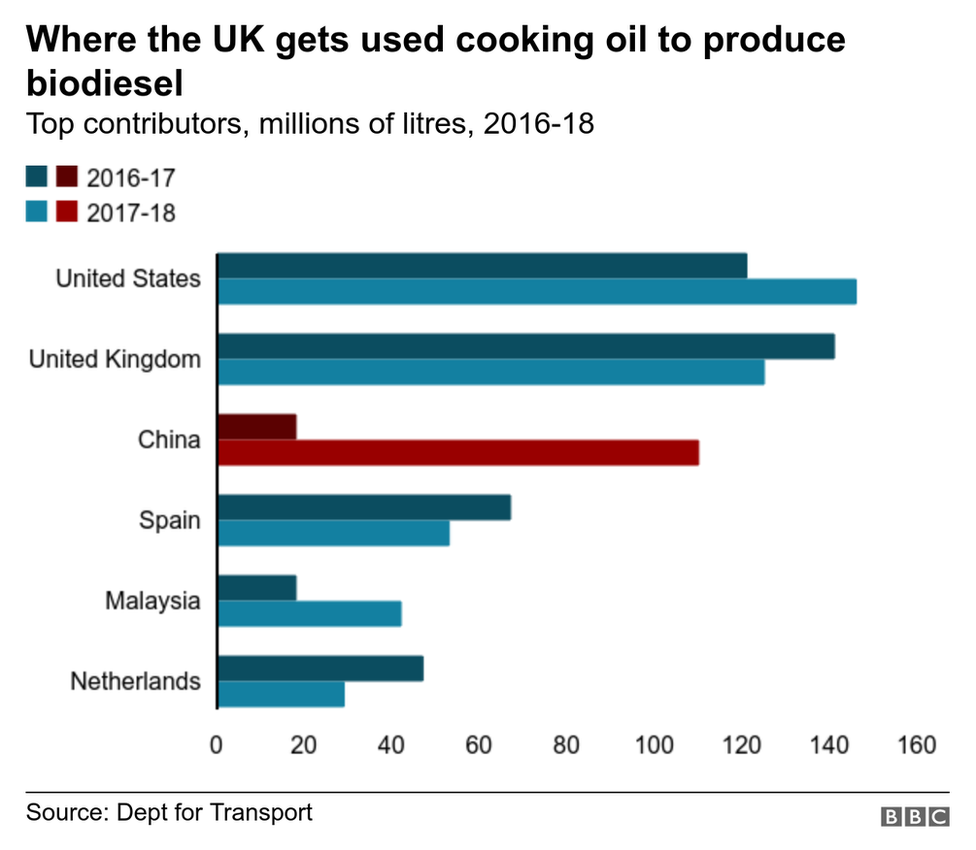Imports of a “green fuel” source may be inadvertently increasing deforestation and the demand for new palm oil, a study says.
Experts say there has been a recent boom in the amount of used cooking oil imported into the UK from Asia.
This waste oil is the basis for biodiesel, which produces far less CO2 than fossil fuels in cars.
But this report is concerned that the used oil is being replaced across Asia with palm oil from deforested areas.
- One woman’s fight to save rainforest
- Coffee waste ‘could replace palm oil’
- How sustainable is supermarket palm oil?
Cutting carbon emissions from transport has proved very difficult for governments all over the world. Many have given incentives to speed up the replacement of fossil-based petrol and diesel with fuels made from crops such as soya or rapeseed.
These growing plants absorb CO2 from the atmosphere and so liquid fuel made from these sources, while not carbon-neutral, is a big improvement on simply burning regular petrol or diesel.
In this light, used cooking (UCO) oil has become a key ingredient of biodiesel in the UK and the rest of Europe. Between 2011 and 2016 there was a 360% increase in use of used cooking oil as the basis for biodiesel.

Because UCO is classed as a waste product within the EU, UK fuel producers are given double carbon credits for using it in their fuels. This has sparked a boom in demand for used cooking oil that is so great it is being met in part with imports from Asia.
In the UK, the most common feedstock source of biodiesel between April and December 2018 was Chinese UCO, totalling 93 million litres. In the same period, used cooking oil from UK sources was used to produce 76 million litres of of fuel.
Now a new study, from international bioeconomy consultants NNFCC, suggests that these imports may inadvertently be making climate change worse by increasing deforestation and the demand for palm oil.
The problem arises because used cooking oil in some parts of Asia is not classed as a waste product and is considered safe for consumption by animals.

The report’s authors are concerned that since it is more profitable to sell Asian UCO to Europe for fuel rather than feed it to animals, it is likely being replaced by virgin palm oil which is cheaper to buy.
“Although correlation does not necessarily equate to causation, the available evidence indicates that palm oil imports into China are increasing, in line with their increasing exports of used cooking oils,” the report states.
Between 2016 and 2018, palm oil imports into China rose by 1 million tonnes, an increase of more than 20%.
“As soon as that point is reached where you can sell used cooking oil for more than you can buy palm oil, it’s a no brainer,” said Dr Jeremy Tomkinson who co-authored the report for NNFCC.
“What you are going to do if you’re in Asia, you’re going to sell as much UCO as you can to the EU and buy palm oil and pocket the difference.”
Demand for palm oil has led to large-scale deforestation and the loss of natural habitats across Indonesia, Malaysia and Thailand. Between 2010 and 2015, Indonesia alone lost 3 million hectares of forest to continued expansion of palm oil cultivation.
Each hectare of forest that’s converted to palm oil releases large amounts of carbon dioxide, equivalent to 530 people flying economy class from Geneva to New York according to a recent study.
Most of the used cooking oil that’s already imported is made from palm. But it’s the extra demand from Europe, say the authors, that is likely to be fuelling deforestation.
“It’s irrelevant if the virgin palm is going into the biodiesel or into the animals,” said Dr Tomkinson.
“If we weren’t pulling that resource out of the market, no new resource would be falling into it.”
The UK government rejects the idea that imports are increasing demand for palm oil. The Department for Transport says that there is no evidence showing a causative link between policies on waste-derived biofuels and increased use of virgin oils.
The department argues that they have worked hard to ensure that such indirect effects do not happen.
“Biofuels are a key way of achieving the emission reductions the UK needs and we have long been at the forefront of action to address the indirect effects of their production, including pushing the EU to address the impact of land use change,” a spokesperson said.
“Last year alone biofuels reduced CO2 emissions by 2.7 million tonnes – the equivalent of taking around 1.2 million cars off the road.”
Counting double
One of the key elements that’s making used cooking oil so valuable is the fact that producers in the EU are given double the number of carbon credits for using the waste material. While the EU allows all countries to “double count” carbon credits for UCO, the UK is one of the few countries to put this into practice.
Oil importers say the “double counting” is vital in preventing even more palm oil from entering the European market.
“Biodiesel made from waste oil is more expensive to produce; it has higher production costs,” said Angel Alvarez Alberdi from the European Waste-to-Advanced Biofuels Association.
“If we don’t have a policy incentive of double counting then under normal market conditions you will have the cheapest available option and that is conventional palm based biodiesel that would still be able to reach the EU.”
However, the report authors say that the policy has other dangers, not just because it may be driving up demand for palm oil in Asia but because it may also be stymieing development among other alternative fuel producers, such as ethanol in the UK.
The authors want the government to review the practice and perhaps end the double credit for imported oil
“If it comes from outside of the EU don’t let it double count unless you put in increased levels of scrutiny to verify it’s not having an impact on land use,” said Dr Tomkinson from NNFCC.
“If you don’t do that then you only get a single credit for that used cooking oil.”
Environmental groups are also concerned about the potential impact that UK and EU imports of UCO are having.
“Making biodiesel from imported UCO is no longer the environmental good it was once perceived to be,” said Greg Archer, UK director of the environmental group Transport and Environment.
“There are real concerns some of these oils may not be genuinely ‘used’ or they may be indirectly causing deforestation. Governments need to scrutinise the source of UCO far more closely and require organisations certifying biofuel feedstocks to undertake far more rigorous and extensive checks.”
Follow Matt on Twitter @mattmcgrathbbc
https://www.bbc.co.uk/news/science-environment-48828490
.
.
See earlier:
KLM and SkyNRG to open factory to produce “low carbon” jet fuel, mainly from “wastes” (like used cooking oil)
Airlines are desperate to find some form of fuel that they can claim is “low carbon” and that does not have obviously negative environmental and social impacts. Finding these miracle fuels is the only way the industry could continue its rapid growth in fuel burn, for decades to come – in the face of the global climate emergency. Dutch airline KLM is keen to get “sustainable” aviation fuel (SAF), working with SkyNRG. They are hoping to use “regional waste and residue streams such as used cooking oil, coming predominantly from regional industries” as feedstock. A plant is being built, to be opened in 2022, making this fuel. KLM says: “From 2022, the plant will annually produce 100,000 tonnes of SAF …. It will mean a CO2 reduction of 270,000 tonnes a year for the aviation industry.” That number all depends on how it is measured – they are regarding this fuel as causing the emission of at least 85% less CO2 than conventional kerosene. (Is that realistic?) KLM says: “There will be absolutely no use of food crops, such as soya oil and palm oil (or by-products such as PFAD and POME), for production.” Biofuelwatch has calculated that using all tallow worldwide for biofuels could only supply 1.7% of global aviation fuel burned in 2016. Converting all Used Cooking Oil that can be realistically collected in the EU and USA would meet just 0.16% of US aviation fuel and 0,26% of EU aviation fuel use respectively.
.
.
Arlanda airport offering 10% biofuel from American used cooking oil, in “symbolic” initiative
The only form of biofuel that airlines have been able to use, and make credible claims that the fuel is low carbon, is used cooking oil. No other forms of fuel made from biological sources can be produced without negative environmental impacts. Therefore Stockholm’s Arlanda airport has had to turn to American used cooking oil, in its attempt to get jet biofuel for its public relations purposes. Arlanda is now using 10% cooking oil, from SkyNRG and Air BP, in Los Angeles (flown over, presumably?) to be put towards fuel for flights made by Swedavia staff. Swedavia is the Swedish state-owned organization that owns and operates 10 airports in Sweden. The quantities of the new fuel are tiny in relation to all the fuel used at the airport, and are seen as symbolic. But Swedavia, SAS Scandinavian Airlines and other airlines are keen to see more use of biofuel, as they hope this will be considered to be cutting their carbon emissions. However, the costs of any biofuel are high, and it is not commercially viable. The industry is keen to get government subsidies to develop more biofuels, to give the impression the industry is environmentally responsible. Biofuels for aviation are, in reality, a “red herring” achieving very little in terms of carbon, or environmental footprint.
.
.
